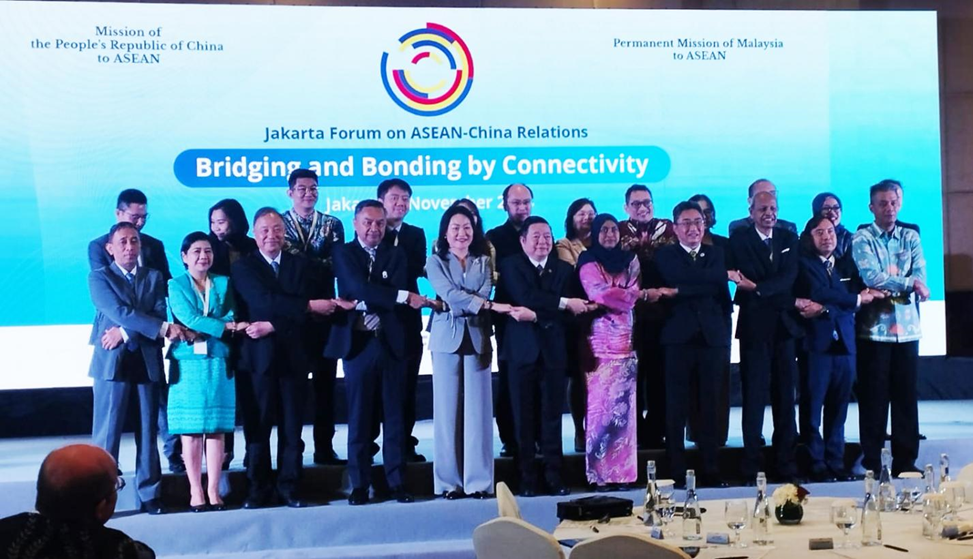
The Association of Southeast Asian Nations, or ASEAN, and China are seeing their economic and trade relationship grow and are taking steps to enhance connectivity between their people, in order to develop into a community with a shared future, a forum heard on Friday.
Speakers from ASEAN and China, who shared their views and experiences at the Jakarta Forum on ASEAN-China Relations, acknowledged the significant success made by ASEAN and China in advancing their trade and investment relationships.
Secretary General of ASEAN Kao Kim Hourn pointed to the advancement of ASEAN-China dialog relations that had matured into a Comprehensive Strategic Partnership that was established in 2021 with the aim of opening up more opportunities for the two sides.
China has been ASEAN’s largest trading partner since 2009, with bilateral trade volume surging from $178 billion that year to $696.7 billion in 2023.
Chinese investments in ASEAN, Kao added, had risen nearly sevenfold during the past two decades, from $1.2 billion to $17.3 billion in 2023.
“These impressive numbers tell a compelling story of our deepening economic ties and shared prosperity,” Kao said in his keynote address to open the forum.
Sarah Al Bakri Devadason, the permanent representative of Malaysia to ASEAN, noticed the importance of developing ASEAN-China digital connectivity that benefits all, under the Master Plan on ASEAN Connectivity and the Belt and Road Initiative.
Hou Yanqi, China’s ambassador to ASEAN, and other government and non-government officials from China, Malaysia, and Indonesia also took part, many as panelists.
Hou said China and ASEAN share geographical proximity, cultural affinity, and converging interests.
“Since the establishment of the Comprehensive Strategic Partnership in 2021, the two sides have achieved remarkable results in building a peaceful, safe, and secure, prosperous, beautiful, and amicable home together. And our mutually beneficial cooperation has been fruitful.”
Hou mentioned Premier Li Qiang announcing during an ASEAN leaders’ meeting with its partners in Vientiane Laos last month the substantial conclusion of the China-ASEAN FTA 3.0 Upgrade Negotiations and the reaching of important consensus on developing smart agriculture, building sustainable and inclusive digital ecosystems, and safeguarding industrial chain stability.
CAFTA 3.0 negotiations, beginning in November 2022, have focused on the reduction of nontariff barriers, the increasing of connectivity, and promotion of digital and green economies.
Dino Patti Djalal, founder and chairman of FPCI, which held the forum jointly with the Mission of the People’s Republic of China to ASEAN, delivered welcoming remarks.
Djalal said what makes ASEAN unique and ASEAN-China relations special is in the emphasis on people-to-people relationships.
“It’s not just the trade, it’s not just the investment, it’s not even just the university exchanges … No, it’s really about a deeper, wider engagement of people, connecting with people,” said Djalal, who is a former deputy foreign minister of Indonesia.
Panelists included Dina Kurniasari, the director of ASEAN negotiations at Indonesia’s Ministry of Trade; Beni Suryadi, the acting executive director of ASEAN Center for Energy; Yang Ziyin, the managing director and deputy head of Southeast Asia and South Asian Region of CICC International; and Xue Wu, chief strategy officer of Huawei Asia Pacific Strategy and Marketing Department. Other panelists included Secretary General of ASEAN-China Center Shi Shongjun; Dato’ Abdul Majid Ahmad Khan, president of Malaysia-China Friendship Association and formerly Malaysia’s ambassador to China; Director General of the International Research Center of Big Data for Sustainable Development Goals Guo Huadong; Co-Founder of the Foreign Policy Community of Indonesia Dewi Fortuna Anwar; and founder of the ASEAN Youth Organization Senjaya Mulia.
Their views were shared at panels titled Responsibilities and Contributions of Enterprises on Boosting ASEAN-China Connectivity, and Achievements and Future Cooperation on Strengthening ASEAN-China People-to-People Bonds.
Kao mentioned the significant progress made by ASEAN and China in advancing people-to-people relationships, with their adoption at last month’s ASEAN summit in Vientiane of the Joint Statement on Deepening Cooperation in People-to-People Exchanges.
The statement declares China’s vision to build a “closer ASEAN-China community with a shared future” and takes note of China’s initiative to build a peaceful, safe and secure, prosperous, beautiful, and amicable home in the region.
At the Vientiane summit, ASEAN and Chinese leaders agreed to cooperate in education, public health, youth issues, tourism, culture, sports, sustainable development, think tanks and the media, scientific and technological innovation, human resources development, employment, and to cooperate among localities.
“From expanding youth scholarship programs to establishing mechanisms for tourism cooperation, we are placing our peoples at the heart of our collective efforts to foster regional peace, drive innovation, and create shared prosperity,” ASEAN’s secretary general said.
Guo Huadong stressed the importance of holding more workshops for young scientists from ASEAN and China.
He said his office had invited 15 young scientists from Indonesia’s geophysics agency, BMKG, to visit Beijing for two weeks, to attend a workshop on subjects including the using of big data for earthquake monitoring and environment monitoring.
“So, we should pay attention to using what I said, science, general innovation, especially big data,” the Chinese professor said.
The writer is a freelance journalist for China Daily.